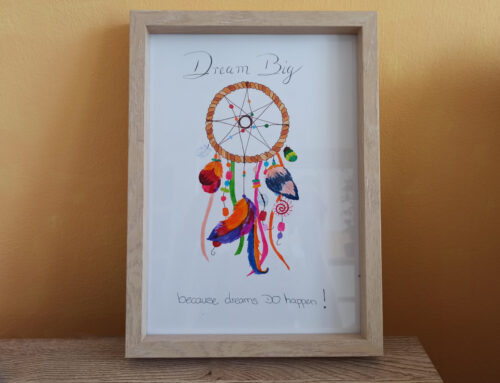How the made-up concept of “being behind” shapes our reality and is detrimental to our health
Nobody likes to be “behind”. We’ve learned early on in life that to be behind means you’re failing. You’re not among the top students. You’re not a bright person. You’re too slow, too lazy, don’t have it in you, so if you don’t want to be a loser you’ll better not be “behind”.
But has anyone ever stopped and considered the very framework that determines that there even is such a thing as “behind”?
Our human brain’s need for classification
Who gets to say what is considered behind and what’s “adequate progress”? If you look at children between the age of 0 and 6, no two of them will have the same developmental process. Yet, by the age of 6 they usually all know how to crawl, how to walk, how to talk and how to use knife and fork. Obviously, there are other factors that play a role in the development, but I mean on average.
Who says that just because Child A can’t walk at age 1.5, but already expresses itself well for its age, and Child B can walk at age 1.5, but has trouble speaking, that one is “behind” compared to the other? It just doesn’t make sense! We’re human beings and each has their own processes to go through on the journey of evolution until we die. And yes, different people will have learned different things by then, but who is to judge what’s “behind”?
I know our human brain likes to keep things simple, to put people and concepts into neat little boxes, so it has a sense of control. It’s our brain’s way of making sense of the world and evaluating whether a certain situation is potentially dangerous or not.
For our brain there are only two options, survival or death. And in other times in human history, being “left behind” by your tribe meant very probably death. So in order to keep us alive, our brain wants to make sure that we’re not “behind” and draws on its experience of what has worked in the past – which must have been the “right way”, because we stayed alive through it.
But it isn’t necessarily the most joyful and fulfilling way, nor does it set our nervous system at ease …
So if anyone wants to tell you what’s what – especially what’s the “right way” to do things – take a moment to consider that it’s a system of classification they (or rather, their brain) have made up. Simple as that.
How to get an A
I recently watched the speech “Work (How to give an A)” by conductor Benjamin Zander, in which he demonstrates very vividly, what our system of classification, of putting one person “before” another, does to our human psyche and how it just guides us onto this downward spiral of “not enough”, “behind” and “a failure”.
When musicians play their instruments, he reasons, there are always two parts of that person involved, the one playing and the one standing behind and nagging “that was dissonant”, “wait until you come to that passage you always f*ck up”, “see how the person next to you plays so effortlessly, you’ll never be as good”.
And he shows another way. At the beginning of a semester, he tells his students they will finish with an A, period. And the condition to get there is to write and hand in a letter within the first two weeks, with the date of the end of the semester. The letter is supposed to start with “Dear Mr. Zander, I got my A because …” and then the student writes from the perspective of themselves at the end of the semester, so basically the perspective of the person they will have become by then. And then Mr. Zander simply leans back and watches them evolve into that future version of themselves throughout the course.
Genius!
Because he understands that the gradation system is just another framework we made up to classify humans into “success” or failure”, “good” or “bad”.
From solving problems to allowing possibilities
It’s the same principle we follow in Soul-based Coaching and it’s deeply in line with Albert Einstein’s famous quote “We cannot solve our problems with the same mindset that created them.”
Because what we so often do is look at the problem and try to figure out a solution from here. Or worse, our goal is to “get away from the problem”. All it does is keeping our attention on the problem, which usually goes along with tunnel vision or even a trauma response if the problem seems overwhelming. Like the students trying to get better, compare and compete and only getting into a downwards spiral instead of enjoying playing the music, which probably was the reason for studying it in the first place.
But when instead we focus first on where we want to go (like who the students will have become after the course) and paint a clear picture of what that’s like, how we walk, how we talk, what our relationships are like and how we feel inside, and only then look at the problem, from over there, it suddenly becomes much easier to find out what needed to happen for us to get there, which steps and developments we needed to make. It’s easier to grow into that person if we’ve already connected to them.
Neurological responses
I myself feel “behind” all the time. I don’t have enough time (= I’m behind on time), there’s too much to do (= I’m behind on time/on my duties), I don’t have the right body shape/size/type (= I’m behind on being successful), or so my brain tells me. I’m not a good enough coach (=behind on my skills), don’t have anything important to say (= behind on wisdom), don’t know how to live my life “right” (= behind according to the standards of success that someone set).
I know that my brain just wants to protect me, urge me to do more, to do better, in order to not be left behind. I believe it’s a valid fear and neurological response, because our brain’s main function is to keep us alive as human beings, so we need to consider everything unknown as potentially dangerous. And in today’s society, things like rest, allowing, being okay just where we are, is unknown territory! In the logic of our brain, to slow down, let alone stop moving, seems like a threat, because it means we could be left behind. And being left behind by your tribe meant almost certain death at the time when our brains developed…
But there’s also another part of my mind which can tap into a deeper intelligence and which knows that this is bullshit!
So how can we get out of “feeling behind” all the time?
The societal aspect
What if we embraced the idea that there is no such thing as “behind”, that it’s simply a concept made up by man. And with “man” I simply mean humankind, a human being. Which at the time that many of our current systems were shaped, meant it was probably a white, cis-gendered, straight, old, rich dude with privilege who wanted to stay in power or at least keep the privilege to the people he considered elite.
What if “behind” is just another lie patriarchy and capitalism have invented to keep us in a feeling of insufficiency (either being insufficient or having insufficient resources), so we jump onto the rat race of “never enough”?
What if “behind” is just another way to keep us thinking we have to look for the flaw in ourselves instead of questioning the systems around us that create the conditions of the rat race in the first place?
A possible solution?
What if you could never be behind, but are instead always at the right spot according to your personal rhythm?
What if there is no “catching up” that you need to do, because you’re already a perfectly imperfect human being right in this moment? And all that’s happening is you evolving from one right version of you to the next right version?
What will become possible if you embrace that you can never actually be behind, that you’re always exactly where you need to be?
[If you want to explore this possibility so you can take a deep sigh of relief and flourish, let’s meet for a coffee and see how we can make that happen.]
Repeat after me:
I am a perfectly imperfect human being
and exactly where I need to be in any given moment!











